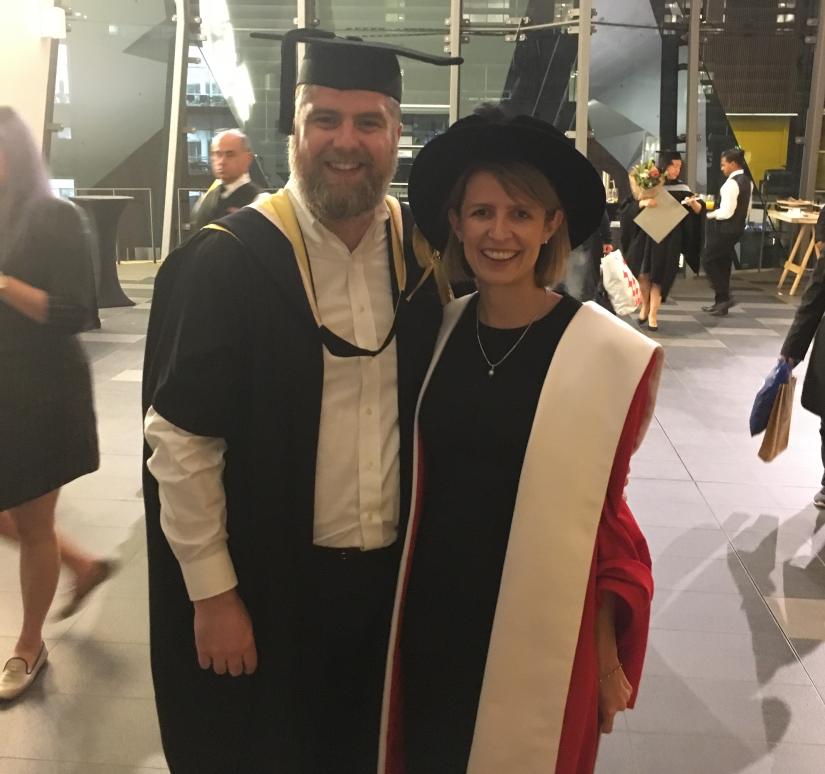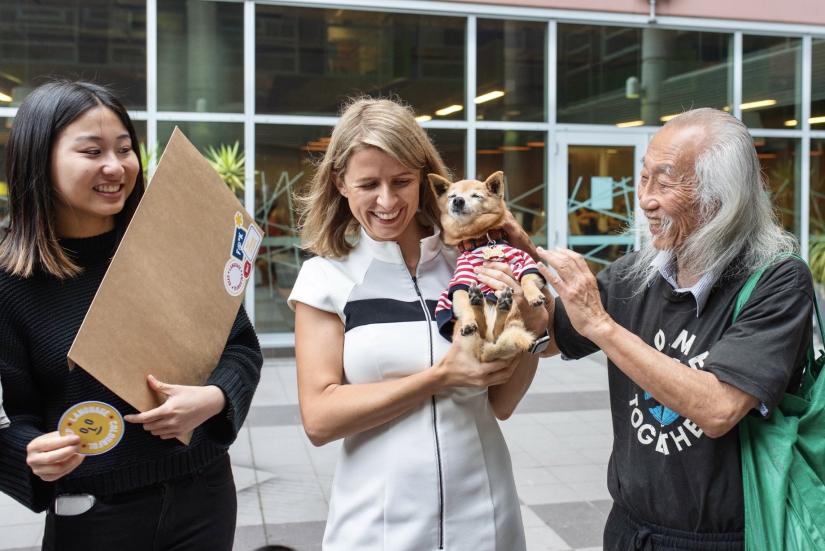Dissecting discourse and contemplating criminality
A $500 fine for a four-letter word. WTF? According to NSW law, if you use some swear words in the presence of a police officer or in a public place, you could receive this punishment. And if you’re an Indigenous Australian, your chance of receiving such a fine is even higher. Elyse Methven explains.
Today, Elyse Methven is a UTS Senior Lecturer in Law studying offensive language and criminal justice, and teaching criminal and sentencing law. Working in the NSW criminal justice system and being exposed to some of Australia’s most colourful criminals, Elyse began to question the inherent bias we bring to our everyday communication. If you say the wrong thing at the wrong time, it could be on your record for good. So, where did Elyse’s story begin?
Back to the beginning
At UTS. "I studied law straight out of high school,” Elyse says.
"I started in a combined degree with law and communications because I was initially interested in politics, and at the time, many women in politics had law degrees. But I ended up dropping out of the communications degree early on, because I wanted to focus on the legal aspect – I was really enjoying criminal justice and international law subjects, which led me to pursue work in one of these fields.”
The NSW Crime Commission
After completing her undergraduate degree, Elyse spent time abroad in Canada as part of her exchange with UTS and then went on to stay and work as an ESL teacher abroad. During her time in Canada, Elyse successfully applied to work at the New South Wales Crime Commission and returned to Australia to work as a paralegal. It was a move that allowed Elyse to complete the practical legal training required to become a qualified solicitor.
“One of the great aspects of my time at the Commission was the teamwork. I worked with really dedicated, clever people. And there were some interesting experiences along the way,” Elyse reflects.
That work included appearing before judges and magistrates to obtain surveillance device warrants and telephone intercept warrants.
“I can’t say too much, but you I learnt a lot about the kinds of criminal activity and personalities in New South Wales,” smiles Elyse. “I guess you could say I had a good sense of the criminal underground of Sydney, or at least what they were allegedly doing at the time.”

Elyse graduating with her PhD (pictured with David Carter, also a Senior Lecturer in Law at UTS).
Out of context, out of mind?
During this time, Elyse became interested in the assumptions police, lawyers and politicians rely on criminal law to deem certain words offensive (and deserving of criminal punishment).
“For example, is it more offensive to swear in front of a woman and her child at a park than it is to swear in a company boardroom or a football match? And if so, why?” Elyse asks.
“During my time at the crime commission a defendant’s criminal assets were being confiscated. His story was like others I had seen – he had gotten into the criminal justice system at a very young age, but this time it was through swearing at a police officer and being charged with offensive language.
“Looking at the trajectory from that initial, quite minor, police interaction and seeing it develop to something quite serious, I started to become more and more curious.”
For example, is it more offensive to swear in front of a woman and her child at a park than it is to swear in a company boardroom or a football match?
So, in 2011, Elyse returned to UTS, joining the Faculty of Law as the inaugural Quentin Bryce Doctoral Scholar and teaching fellow. Fast-forward six more years and Elyse successfully completed her PhD exploring the linguistic representation of offensive language crimes in the criminal justice system. In 2018, she was then awarded a UTS career research grant for a project on police discretion and the use of penalty notices – a continuation from her PhD and mapping the policing of offensive language in NSW.
“In 2011, I saw, opportunistically, that UTS were advertising the Quentin Bryce scholarship, and I thought that was a good chance to embark on a PhD to explore the topic,” Elyse remembers.
“I had such a positive experience as a student at UTS which is why I chose to pursue my PhD and then continue to work there. I was surrounded by inspiring scholars who took a critical approach to analysing legal issues, and I found a strong emphasis on interdisciplinary research and teaching at UTS,” Elyse reflects.

Elyse pictured with Danny Lim when she participated in a campaign to decriminalise swearing, as Lim was arrested for offensive behaviour but ultimately acquitted.
“I started to think, more and more, what is it about swearing? Firstly, what is it that makes swearing something that is still considered a criminal offence in NSW? Why it is that swearing, or four-letter words, are so offensive as opposed to other words we use in the English language? And why does that change based on who is saying them and where, even if it is, by definition, within a public place?
“I then began to consider the stereotypes or assumptions police and judicial officers bring with them when they determine that these words are so offensive. What assumptions do people have about appropriate decorum in public places? And what places do we extend those assumptions to, for example comparing a church or a football match with a university lecture hall?
“Swearing is one of those topics where you can ask your mum or your dad or a person on the street, and they'll all have a different opinion.”
What assumptions do people have about appropriate decorum in public places? And what places do we extend those assumptions to, for example comparing a church or a football match with a university lecture hall?
What will tomorrow bring?
There’s certainly no slowing down. Currently Elyse splits her time between continued research, writing a book on offensive language crimes, teaching, and remaining active in the legal sector.
“I feel a great deal of ownership over the criminal law and criminal sentencing law courses that I helped to develop at UTS. I enjoy teaching them, and I am always inspired by the excellent students we have at UTS Law Faculty. Some of them have similar experiences or aspirations to me when I was at UTS, and it's nice to now play some part in their own journey.”
As for her research, Elyse hopes it will continue to drive discussion about our evolving justice system and shed light on some of the inherent biases we bring into understanding legal and social issues.
“If we continue to interrogate those prejudices, we can start to understand their role in reproducing unequal power relations and criminalising the conduct of minority or vulnerable populations,” says Elyse.
“Talking about it is often the first step to making change.”
